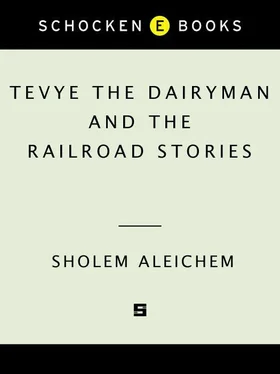3 Rashi — The acronymic name of Rabbi Shlomo Yitzchaki of Troyes (1040–1105), whose popular commentary on the Bible is commonly read by observant Jews on the Sabbath in the course of reviewing the weekly portion from the Pentateuch.
4 Targum — The first-century Aramaic translation of the Bible by Onkelos the Proselyte that, like the commentary of Rashi, is traditionally studied with the weekly Torah reading.
5 Perek — The Mishnaic tractate of Pirkey Avot, The Ethics of the Fathers . (See this page.)
6 Zon umefarneys lakoyl —“For He is a God who nourishes and supports all life”; from the grace regularly recited after meals.
7 Mi yorum umi yishofeyl —“Who shall be raised up and who shall be brought low”; from the unesaneh toykef prayer on the High Holy Days, in which God is described as deciding the fates of everyone for the coming year. In the prayer book the phrase occurs as mi yishofeyl umi yorum , “who shall be brought low and who shall be raised up.”
8 Atoh bekhartonu —“For Thou hast chosen us among all the nations”; from the holiday prayer book.
9 Vayehi hayoym —“And it came to pass”; a common Biblical phrase introducing a new story or episode in a narrative.
10 Shimenesre —The “eighteen benedictions,” a lengthy devotion recited as part of the morning, afternoon, and evening prayers and structured around nineteen (originally eighteen) blessings, the first of which begins, “Blessed art Thou, O Lord, our God and God of our fathers, God of Abraham, God of Isaac, and God of Jacob.” When praying by himself, a Jew says the shimenesre silently and without moving from his place — which only heightens the comedy of Tevye’s shouting the prayer out loud while running after his horse.
11 Mekhalkeyl khayim bekhesed —From the second benediction of the shimenesre , as is umekayeym emunosoy lisheyney ofor .
12 Re’ey-no be’onyeynu —From the seventh benediction.
13 Refo’eynu veneyrofey —From the eighth benediction.
14 Boreykh oleynu —From the ninth benediction.
15 Velamahhinim al tehi tikvoh —From the twelfth benediction.
16 Ov harakhamon —From the sixteenth benediction.
17 Shma koyleynu —“Hearken to our voice”; from the sixteenth benediction.
18 Khus verakheym oleynu —“Have mercy and pity us”; also from the sixteenth benediction.
19 Retsey—“Accept Thy people Israel, O Lord, our God, and hearken to its prayers, and restore its worship to Thy holy temple”; from the seventeenth benediction.
20 Hamavdil beyn koydesh lekhoyl —“Blessed art Thou, O Lord, our God, King of the Universe, who separateth the holy [Sabbath] from the profane [week]”; from the havdalah , the prayer formally ending the Sabbath that is said on Saturday night. Tevye’s comic rhyme implies that God not only keeps the Sabbath and the rest of the week well apart from each other, but also does the same with the rich and the poor.
21 Bemokoym she’eyn ish—“In a place where there are no men [of moral or religious stature], try to be a man”; from The Ethics of the Fathers . Tevye’s rhyme stands this adage on its head: whereas the original quotation means that in a place where ideals of conduct are disregarded one must nevertheless try to live up to them, he himself is saying that when the reality falls short of the ideal, one makes do with what there is.
22 Vehayeled eynenu —“And he returned unto his brethren and said, ‘The child is not’ ”; Genesis, 37:30.
23 Yom Kippur songs — Being a penitential fast day, Yom Kippur, the Day of Atonement, does not have festive songs, though some of its prayers are sung in the synagogue. Tevye’s choice of these inappropriate melodies reflects how drunk he is.
24 “King Solomon wasn’t joking”—Tevye is referring to the verse in Ecclesiastes, 7:28, “One man among a thousand I have found; but a woman among all those have I not found.”
25 Koyl oyreyv lemineyhu —“Every raven after his kind”; Leviticus, 11:15.
26 Raboys makhshovoys belev ish —Proverbs, 19:21.
27 Kulom ahuvim, kulom brurim—“All are beloved, all are elect , all are intrepid, all are holy, all perform the will of their Maker in awe.” From a description of the angelic hosts in the morning prayer.
28 Yehalelkho zor—“Let another man praise thee , and not thine own mouth.” Proverbs, 27:2.
29 Odom yesoydoy mi’ofor —“Man is but dust.” From the High Holy Day prayer.
30 Hakoyl hevel— “All is vanity.” Ecclesiastes, 1:2.
31 Koyl dikhfin yeysey veyitzrokh —Tevye is jokingly misquoting the opening line of the Passover seder ritual. According to the Haggadah, the seder liturgy, Jews sitting down to the ceremonial meal begin by inviting the homeless and hungry to join them, saying, Koyl dikhfin yeysey veyeykhul; koyl ditzrikh yeysey veyifsakh —“Let all who are hungry come and eat; let all who are needy come and observe the Passover.” Tevye’s version, however, means, “Let all who are hungry come and be needy.”
32 “If you don’t mind my quoting King David”—Tevye is clowning, for he knows perfectly well that this verse from Ecclesiastes is attributed to King Solomon, not to King David, who is traditionally considered to be the author of Psalms.
33 Akudim nekudim uvrudim —“And behold, the rams which leaped upon the cattle were streaked, speckled, and grizzled.” Tevye likes these words from Genesis 31:10 because of their rhythm and internal rhyme, and uses them to refer a series of something without being overly pedantic about their literal meaning.
34 Begapoy yovoy uvegapoy yeytsey—“If he comes [to his master] with nothing, he shall depart with nothing.” Exodus, 21:3, from a passage dealing with the Israelite laws of slavery and manumission.
35 Rashi The “commentary” on the verse from Exodus attributed to him by Tevye is, of course, Tevye’s own
36 “I’m talking Purim costumes and you’re talking Hanukkah candles”—On Purim, the holiday celebrating the foiling of Haman’s plot to kill the Jews, it was a custom in parts of Eastern Europe to dress in costume and go mumming; on Hanukkah, which celebrates the victory of the Maccabees, candles are lit on each of the eight nights of the holiday.
37 Hazoyrim bedimoh berinoh yiktsoyru —“They that sow in tears shall reap in joy.” Psalms, 126:5. Tevye’s misattribution of the verse to Abraham is again deliberate buffoonery.
38 Lav akhboro ganvo—“It’s not the mouse that’s the thief , but the hole [that beckons to it].” A Talmudic proverb.
39 Revakh vehatsolohya’amoyd layehudim .
40 Vayisu misukoys—“And they journeyed from Succoth and encamped in Etham, on the edge of the wilderness.” Exodus, 13:20.
41 Oylim veyordim —“And he dreamed, and behold a ladder set up on the earth … and behold the angels of God ascending and descending on it.” Genesis, 28:12. Tevye seems to be associating the words either with the rotary motion of wheels or with the coming and going of supplicants to a rich man’s house.
42 Eyn oymer ve’eyn dvorim —“Day unto day uttereth speech, and night unto night showeth knowledge. There is no speech nor utterance where their voice is not heard.” Psalms, 19:3.
43 Vehayeled eynenu .
44 Vayivrakh Ya’akoyv—“And Jacob fled with all that he had.” Genesis, 31:21.
Читать дальше












